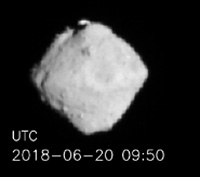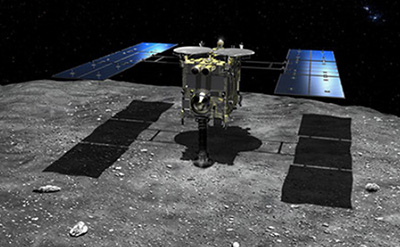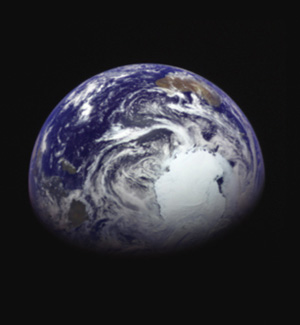News
Hayabusa 2 Meets Asteroid Ryugu on June 27 Updated in August 2018
The Japan Aerospace Exploration Agency (JAXA)'s Hayabusa 2 spacecraft has completed a long journey of three and a half years since the launch and will finally arrive at its destination: the asteroid Ryugu, which is 300 million kilometers from Earth. According to the latest image taken by Hayabusa 2, Ryugu looks like a diamond or a “spinning top.” Rocks containing water and organic matter are expected to exist on Ryugu. Ryugu is now located at about 300 million kilometers away from the Earth. Hayabusa 2 plans to pick up sample rocks by releasing a small landing device on Ryugu and to bring back rock samples to Earth by the end of year 2020.
Hayabusa 2 weighs about 600 kilograms and is the successor to the Hayabusa asteroid probe, the world's first spacecraft to collect and bring back rocks to Earth. Propulsion consists of an ion engine. It carries state-of-the-art equipment like an optical camera and a laser altimeter in addition to a landing device. On December 2014, it was launched from Tanegashima Space Center in Kagoshima Prefecture by an H2 rocket. After Hayabusa 2 traveled within the Earth’s orbit for a while, it recorded greatest proximity to Earth about a year after liftoff. Through an “Earth-swingby,” a process utilizing Earth’s gravity to change direction, Hayabusa 2 was able to travel towards the sun. Its total flight distance to the skies near Ryugu, amounted to about 3.2 billion kilometers.
Ryugu (Dragon’s Palace in Japanese) is an asteroid that goes around the sun in a little more than a year’s time by passing through the Earth’s and Mars’ orbit. It was discovered in 1999. Its distance to Earth is changeable, but now it is about 3 hundred million kilometers apart. Details about its size and shape are unknown, but the estimated width is about 900 meters. It is estimated to be about twice as large as the asteroid Itokawa, discovered by Hayabusa 2’s predecessor. It is believed that rocks containing moisture and organic matter are present on Ryugu, maintaining more traces of the primitive solar system.
According to JAXA's Mission Manager Makoto Yoshikawa who spoke at a press conference on June 21, Ryugu was initially estimated to be sphere-shaped. But after the image taken by Hayabusa 2 on June 20, at about a 100-120-kilometer close-up, it was revealed that the asteroid’s looked like a diamond-shaped spinning top. Some parts of the surface were shaped like craters or boulders. "It also resembles a diamond-shaped abacus ball. Some members from the team say that it looks like the fortress Solomon from the classic anime Mobile Suit Gundam.” “Its rotation cycle is 7.5 hours, which is longer than cycles of other top-shaped asteroids, which average at a rotation cycle of a few hours. It was totally out of our expectation to see the spin-top shape. If we analyze from various aspects, we may be able to resolve Ryugu’s evolution mechanism,” Yoshikawa commented.
According to plans, Hayabusa 2 will stay in the skies 20 kilometers above the asteroid for 18 months in order to continue its probe. It will now survey the asteroid’s surface to determine where the landing devices should be stationed. They are difficult tasks requiring strict control and operation. The first landing is expected to be between September and October.
In 18 months, the team is planning to conduct three rock-collecting operations, to release four small landing devices, and to successfully land on the asteroid’s surface. After the probe, Hayabusa 2 will fly back to Earth. It will drop a capsule containing samples onto the Australian desert by the end of 2020.
http://www.hayabusa2.jaxa.jp/topics/information_e/
https://global.jaxa.jp/press/2018/06/20180627_hayabusa2.html










